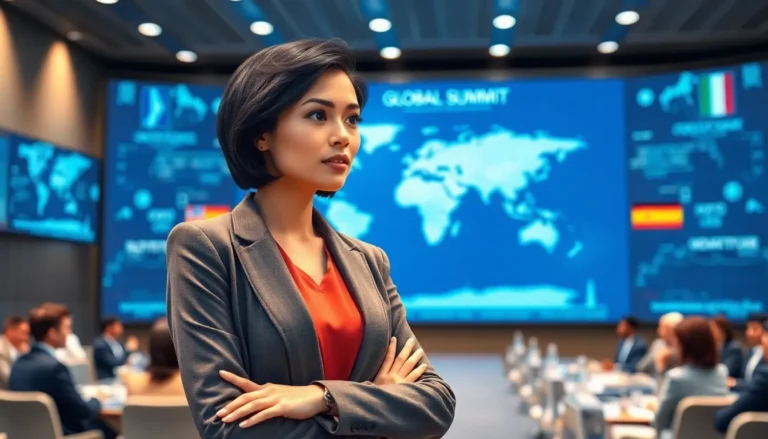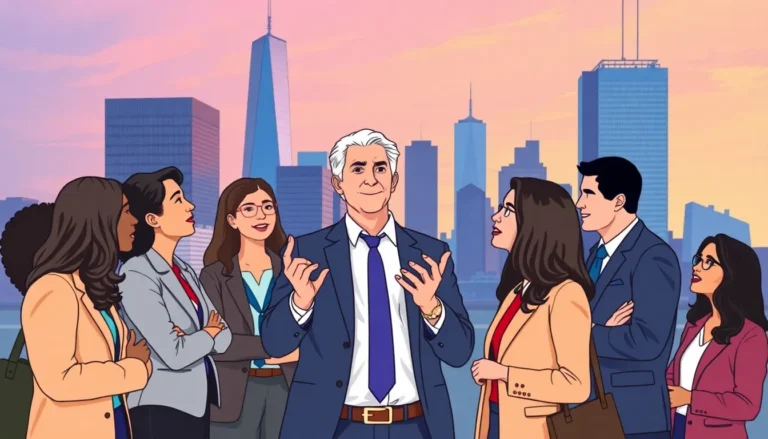In a world where global peace often feels like a game of Jenga, the UN Security Council stands as the shaky tower holding it all together. With its five permanent members and ten rotating ones, it’s a political playground where diplomacy meets drama. Whether it’s addressing conflicts or tackling humanitarian crises, the Council’s decisions can spark joy—or chaos—across nations.
Table of Contents
ToggleOverview of UN Security Council News
Recent developments highlight the UN Security Council’s ongoing efforts to address global conflicts and humanitarian crises. Significant resolutions have emerged regarding situations in Ukraine, Syria, and Yemen, where the Council aims to promote peace and stability.
The Council’s ongoing discussions involve strategies that emphasize diplomatic resolutions. Countries impacted by conflicts often find that Security Council actions play a critical role in either de-escalating tensions or intensifying disputes. Sanctions and arms embargoes are tools frequently employed to influence state behaviors.
Moreover, sessions are regularly held to analyze reports from peacekeeping missions. These reports provide vital insights concerning on-the-ground conditions and the effectiveness of current programs. Member states engage in rigorous debates about how to enhance the effectiveness of peacekeeping missions.
Numerous challenges remain, such as veto power exercised by permanent members. This dynamic often leads to gridlock, where critical decisions stall due to differing national interests. Despite these challenges, public meetings serve to increase transparency and allow for diverse perspectives on issues at hand.
Reports indicate a growing urgency for the Council to adapt to new global security challenges. Cybersecurity threats, climate change impacts, and rising nationalism require innovative responses. Stakeholders frequently urge reforms to ensure the Council’s processes reflect contemporary geopolitical realities.
UN Security Council news encompasses a broad spectrum of vital security issues. Developments range from diplomatic engagements to challenges posed by member states, all influencing the Council’s capacity to navigate complex global scenarios.
Recent Developments in the UN Security Council
Recent news reflects the UN Security Council’s continued commitment to addressing global conflicts, particularly through impactful resolutions and engaging discussions.
Important Resolutions Passed
Resolutions targeting the situations in Ukraine, Syria, and Yemen exemplify the Council’s proactive stance. Notably, a resolution on Ukraine aims to bolster humanitarian aid in the region, facilitating access for relief organizations. The Council also reinforced sanctions against Syria, focusing on those violating human rights and obstructing aid. Furthermore, Yemen’s resolution seeks to establish a ceasefire, fostering renewed peace talks among conflicting parties. Each of these resolutions illustrates the Council’s role in mitigating escalating tensions and promoting stability.
Key Discussions and Debates
Discussions among member states have focused on pressing global security challenges. Cybersecurity threats emerged as a prominent topic, raising concerns over potential repercussions on international peace. Climate change discussions highlighted the need for a cohesive security strategy addressing environmental impacts. Additionally, debates on humanitarian access in conflict zones underscored differing approaches among nations. Regular sessions feature diverse perspectives, reflecting the complexities of contemporary security dynamics. Members actively engage in negotiations that influence the Council’s effectiveness in maintaining global peace.
Impact of UN Security Council Decisions
UN Security Council decisions significantly shape global events, influencing diplomatic relations and international peace initiatives.
Global Reactions
Global reactions to the UN Security Council’s decisions often vary widely. Nations frequently respond to resolutions with both support and opposition, reflecting their political interests. For example, sanctions against specific countries may receive backing from allies while inciting condemnation from adversarial states. Humanitarian resolutions, like those aiding Ukraine, often spark positive public reactions, emphasizing the importance of international solidarity. Additionally, grassroots movements may emerge, calling attention to the Council’s decisions, ultimately amplifying the public discourse surrounding these actions. Such reactions underscore the interconnectedness of national policies and public perception, highlighting how stakeholders influence each other’s positions and strategies.
Effect on International Relations
International relations are deeply impacted by the UN Security Council’s resolutions. Diplomatic ties between countries can strengthen or weaken following the Council’s actions. Resolutions urging ceasefires in conflict zones promote dialogue among warring factions, enhancing collaborative efforts for peace. Conversely, the imposition of sanctions might escalate tensions, leading to distrust between nations. Countries benefit from engaging with the Council, as it provides a platform for negotiation and conflict resolution. Additionally, multilateral agreements stemming from Council discussions can foster alliances, shifting the global balance of power. Decisions made within the Council often set precedents, shaping how states navigate future geopolitical challenges.
Challenges Facing the UN Security Council
The UN Security Council encounters numerous challenges that hinder its effectiveness in maintaining global peace. Veto power, wielded by the five permanent members, often leads to gridlock on crucial resolutions. Disagreements between these members impede essential actions on conflicts, as seen in the stalled responses to the humanitarian crisis in Syria.
In addition to political deadlock, the rapid evolution of threats, including cybersecurity and climate change, demands urgent attention. Adapting strategies to address these emerging issues proves difficult for the Council. Limited resources also impact peacekeeping missions, making it challenging to fulfill mandates in regions like South Sudan and the Central African Republic.
Global reactions to resolutions highlight another challenge. Divided opinions among member states create varying levels of support or opposition, complicating consensus. A resolution aimed at increasing humanitarian aid can face dissent from countries aligned with conflicting interests, which diminishes its intended impact.
Furthermore, the rise of populism and nationalism worldwide affects multilateral cooperation. Nations increasingly prioritize national interests over collective security, resulting in diminished engagement with the Council’s resolutions. Calls for reform gain momentum, as many advocate for changes that better reflect contemporary geopolitical realities, ensuring the Council operates more efficiently.
Finally, transparency remains a pressing issue. Public meetings enhance accountability, yet contradictory statements from member states can sow confusion. The need for clear communication is critical to maintaining credibility in the Council’s actions and decisions. Strengthening these areas may enable the Council to navigate complex global challenges more effectively, enhancing its role in promoting international stability.
Future Trends in UN Security Council News
Emerging trends indicate that the UN Security Council is pivoting toward addressing non-traditional security threats. Cybersecurity has become a priority, especially as nations grapple with rising digital vulnerabilities. Climate change impacts intensify global conflicts, prompting discussions about preventative measures that the Council can implement.
Calls for reform are also gaining traction. Member states advocate for changes to reflect contemporary geopolitical realities, emphasizing the need for a more representative decision-making process. Enhanced transparency can foster trust among nations, encouraging collaborative responses to global crises.
Current discussions spotlight the role of technology in peacekeeping. Innovations like artificial intelligence may improve mission effectiveness. Utilizing data analytics can refine strategies, ensuring timely and targeted interventions in conflict zones.
Multilateral cooperation is essential for navigating complex challenges. Countries are increasingly recognizing the importance of forming alliances to tackle global security issues. Facilitating dialogue through regional organizations could strengthen the Council’s collective response.
Increasing scrutiny from civil society influences Council dynamics. Public demand for accountability pushes member states to prioritize humanitarian considerations. As citizens engage more with global governance, their reactions shape the Council’s approach to resolutions.
Constituents are reacting to the implications of Council decisions more actively. Perceptions often depend on national interests, which can either bolster or undermine resolutions. Navigating these opinions effectively remains a challenge.
Balancing power among member states drives governance debates. The veto power of permanent members continues to create friction, complicating consensus-building. Future negotiations may focus on finding solutions that accommodate diverse viewpoints.
Ultimately, evolving trends highlight the need for the Security Council to adapt to a rapidly changing global landscape. Resilience in the face of new challenges will define its efficacy in promoting international peace and security.
The UN Security Council stands at a crossroads as it navigates the complexities of modern global security. With its decisions carrying weighty implications for international relations and humanitarian efforts, the Council’s adaptability is crucial. Emerging challenges like cybersecurity and climate change demand innovative approaches and collaborative strategies among member states.
As calls for reform grow louder, the emphasis on transparency and representation may help restore trust in the Council’s processes. The ongoing dialogue about balancing power dynamics, especially concerning veto authority, will be pivotal in shaping its future effectiveness. Ultimately, the Council’s ability to respond to evolving threats will determine its role in fostering lasting peace and stability worldwide.









